Refugees in Bremen fighting for protection
Vulnerability, power relation, and the double-standards of structural racism in Corona times
Since the beginning of the pandemic COVID-19, the German media have been full of calls for solidarity, with demands to stand together in times of crisis and to take care of others. A wide range of diverse practices and domains, ranging from neighborhood aid (Vetter 2020, TAZ 2020a) and large national „rescue parachutes“ for the economy (Heuser 2020) to international cooperation between the pharmaceutical industry and research, are all framed as solidarity (WHO 2020). These expanding solidarities can also be read as calls for communitization, defined by the boundaries of the said and the sayable in the Foucauldian sense. In the public discourses, the imagined community of the „we“ is mostly defined as a national one. The closing of national borders to protect one’s population thus seems not only logical but equally natural, as does the restriction to German citizens of the fetch-back action declared as “airlift” with historical references to the Cold War (Tagesschau 17 March 2020). Those who have lived in Germany with another nationality for a long time, sometimes decades, are excluded by this media-effective “rescue mission” (Finke 2020). The exclusions currently observed are not accidental. Instead, they are both the effect and continuation of socio-spatial and discursive exclusions, of which the mass accommodation of refugees in Germany is a central example.
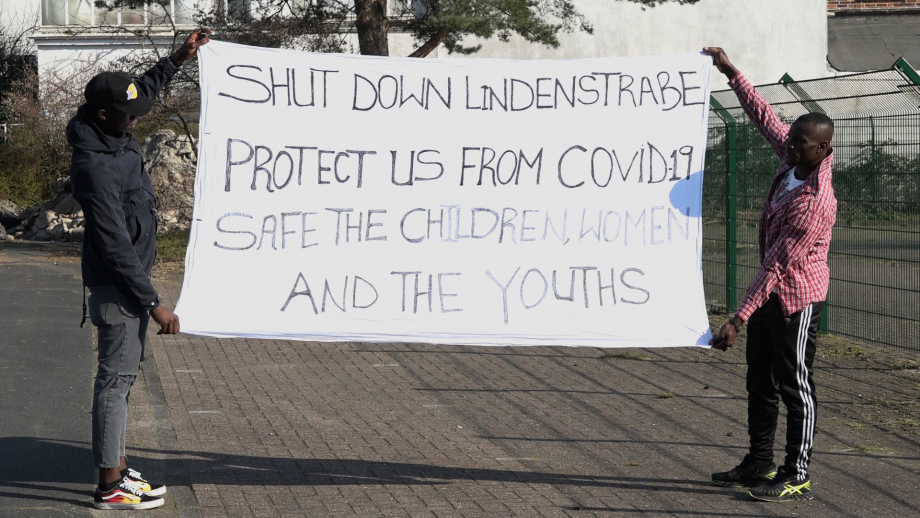
Illustration I: Refugees in Bremen protesting in front of the refugee reception center on Lindenstraße, March 27, 2020. Copyright: Anne Frisius. The author has permission to use the image.
Mass accommodation for refugees in Bremen
Here in Bremen, a city of nearly 600.000 inhabitants in northern Germany, we can observe how the German social welfare authority (led by a Green party member) forces hundreds of people to stay in the mass accommodations on Lindenstraße and Alfred-Faust-Straße. Such enforcement occurred despite apparent protests by the inhabitants and solidarity supporters, like the Bremen Refugee Council (Flüchtlingsrat Bremen) and Together We Are Bremen (TWAB) (TAZ 2020b). The accommodation on Lindenstraße is the central reception center for refugees, where they are forced to stay either by law or de facto due to a lack of alternatives or financial support for other forms of housing. Some women, men, and children live in confinement for many months due to delays in their asylum application procedures. Several hundred people currently live in the accommodation on Lindenstraße. They are sleeping in multi-bed rooms without windows and supplied with oxygen by a central ventilation system. In times of Corona, a central air exchange seems anything but virologically sensible, promoting the fear of infection on the side of the inhabitants. Meals are consumed in groups. The extension of the meal times, propagated by the authorities, cannot function with such a large number of people in a confined space and the requirement of keeping the social distance of two meters. Since visitors were not allowed to enter this camp any more, some of the inhabitants sent pictures of their living conditions to Together We are Bremen, who posted them on its website.
Together We Are Bremen, a self-organized group of refugees and supporters, collected voices and impressions of Lindenstraße inhabitants immediately after the Corona crisis began. One inhabitant made an ironic comment that expressed the general feeling about the confined atmosphere in Corona times: “Good morning, everyone! If disinfecting tables between the intervals of people eating was enough for the Corona crisis, then why is it that all restaurants closed down? The dining here is no different from any other restaurant!” (Anonymus inhabitant, 28/29 March 2020). Already before the pandemic hit Germany, there were multiple health issues in these refugee camps. Among other things, there has been a recent outbreak of scabies in the Lindenstraße accommodation, which makes the risk of infection for Corona all too clear. Only after public intervention by the residents and the supporting Refugee Council of Bremen, the social authorities slowly agreed to move a small number of the residents to an empty youth hostel in Bremen (cf. Keller 2020). In a city like Bremen, where tourism is an important economic factor, countless hotels and guesthouses are currently empty (see also Baur et al. 2020). The owners receive financial support from national and municipal support funds to compensate for missing incomes. On the one hand, there is a real danger of infection for hundreds of people living together in a small confined area. On the other hand, there are vacant accommodation spaces for which the city will pay anyway.
Between rapid response, inactivity and continued violence
From an anthropological perspective, it is interesting to observe how, in Corona times, everything is possible: From the suspension of basic rights up to the distribution of billions of euros, within a couple of days. However, when it comes to the demands to evacuate the refugee camps, be it in Greece or Germany, the repeated answer is that such an intervention is impossible (Buten un Binnen 2020). Why is it possible to frame the situation in this hypocritical way with the agreement of the majority of the German population? How do we explain the mechanisms that contribute to the widespread acceptance of such inaction here in Bremen, the camps in Moria, and elsewhere? The media outcry is mostly absent, while new COVID-19 infection figures are repeated continuously in countless live tickers.
One answer lies in the topos of “crisis” as a flexible legitimation tool and the interlocking of the entanglement of media discourses with architectural structures (cf. Herscher 2017). If we follow media and political discussions on refugees in general (cf. Betscher 2018, 2019; Chouliaraki & Stolic 2017) and about camps like Lindenstraße in specific, we observe how the differential treatment of refugees is regarded as an unquestioned necessity. People living in camps on the outskirts or outside of cities fall out of the aid based on immediate neighborhoods. Their sociospatial invisibility becomes a form of structural silencing. Such silencing is intensified in Corona times because the public space for articulating political and social demands is largely restricted or has shifted into the virtual space. The latter is characterized by its inherent mechanisms of limitations of access to and restrictions for using mobile devices and inadequate internet connection.
The squared state of exception
Already in 2002, Giorgio Agamben has posed the camp as “the space that opens up, when the state of exceptions starts to become the rule” (2002: 181). What we observe presently is a double effect of the different states of exception, which mutually legitimize each other. People who fled from direct and slow violence are facing massive structural violence in Germany that leads to direct threats to their health and integrity. Furthermore, such threats are cynically framed as the best options for protection by the social senator of Bremen, Anja Stahmann, and her spokesperson Schneider: “The closure of the reception center is not an option and does not make sense” (Henkenberens 2020). The official argument is that Bremen would have to provide a central refugee reception center abiding by the national law. In pandemic times, when constitutional rights are curtailed, and exceptional measures are taken, this legal argument seems exceptionally flawed. The lack of adequate public health measures can only be understood when we consider how “the refugee” is discursively established as a “border figure” (Schulze-Wessels 2017). In the “border figure” of the refugee, the social, discursive, and emotional demarcations between the German “we” and the non-German “other” seem to be essentialized and embodied. This prevalent discursive figure and its inner logic legitimize that the body of the refugee is exposed to the double standards of vulnerability and safety in Corona times.
The camp as infrastructure and discourse plays a crucial role in establishing the refugee as the “other.” If we look back at the visual discourses of 2015 and later, refugees were depicted as people without any shelter and hence to be placed with bunk beds in mass accommodation framed as the better and only alternative. Numerous press-pictures showed gyms and halls with beds in line and presented refugees as subjects to be managed in such accommodations (cf. Ladebeck 2018). Herrscher (2018) wrote a history of the camp as architecture and infrastructure with strong ties to colonialism. The historical dimensions of the situation are also sensed and expressed by the inhabitants and supporting activists, namely the colonial legacies inherent to the camp system in general and in this particular situation under the threat of the COVID-19 pandemic (TWAB 2020).
Resistance in Corona times
In the current situation, the only way to claim protection in Lindenstraße occurs via public protest, in establishing visibility of such protest and in preserving the spaces of public expression even in Corona times. On 27 March, the first rally of ten residents took place and was joined by a few supporters. The rally had eventually been allowed after some back and forth negotiations with the public order department (Ordnungsamt).
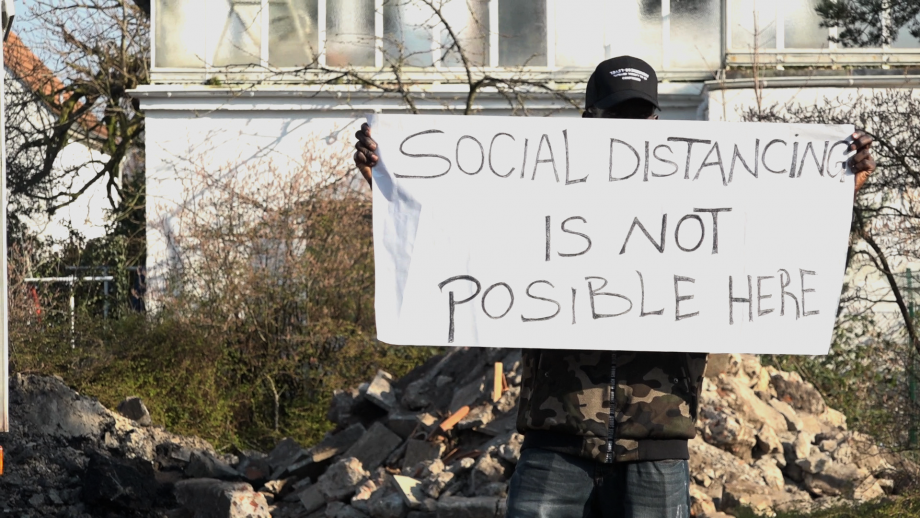
Illustration II: Protest rally in front of the Lindenstraße reception center on March 27, 2020. Copyright: Anne Frisius. The author has permission to use the image.
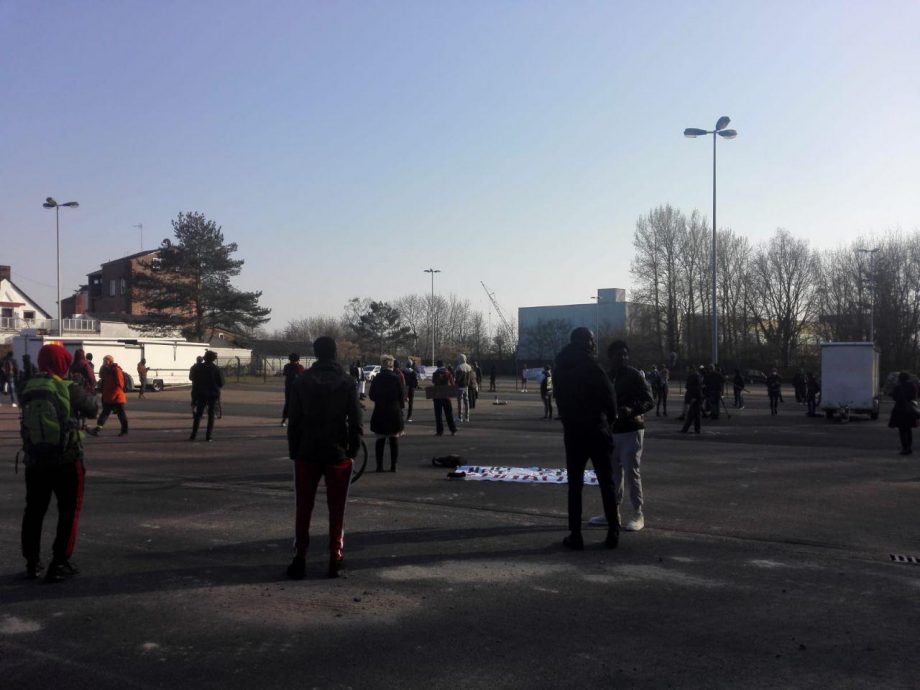
Illustration III: Protest rally in front of the Lindenstraße reception center on March 27, 2020. Copyright: Annonymous supporter. The author has permission to use the image.
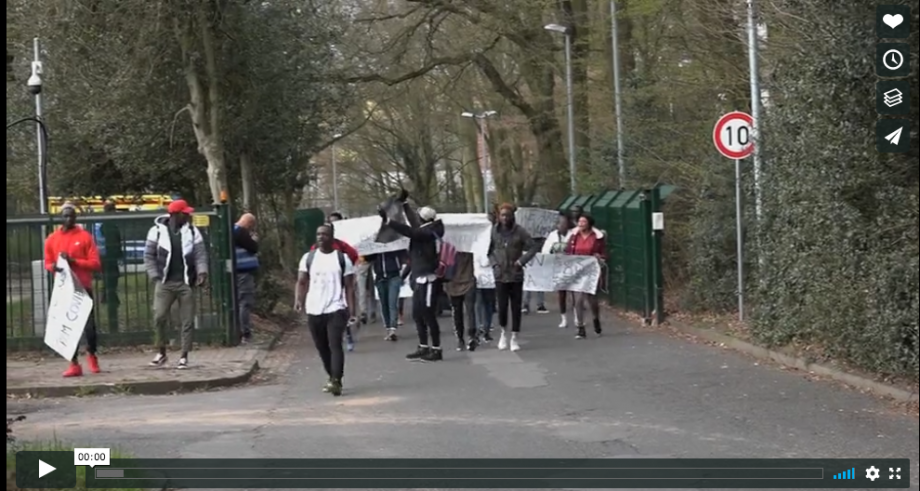
Thumbnail I: Video-Clip of the rally on March 27, 2020. Copyright: Anne Frisius, 2020a (https://vimeo.com/401504344). The author has permission to use the video.
At the rally, everyone stood in fulfilling the demanded social distance of 2 meters. Yet, when people only briefly exceeded the ban on contact, charges for violation of the infection protection law (das Infektionsschutzgesetz, IfSG) were made immediately by the Bremen police department (cf. TAZ 2020d). The first rally during the Corona times in Bremen was accompanied by an online campaign of Together We Are Bremen, a press release of the Bremen Refugee Council, and an online petition.
Applying different strategies of appropriation of public space in a concrete material-geographical and a medial sense, “refugees, asylum seekers, and destitute individuals […] acquire visibility through challenging the same social mechanisms, which control their freedom within and across states. It is this visibility that in turn transforms their politics into discourse” (Bhimji 2016: 448). In Bremen within only a few days, a whole range of actions was realized on the ground: from strategies of mobilizing visibility and gaining a voice in public discourse up to legal interventions by filing a criminal complaint against the responsible persons in the social welfare department and the operators of the accommodation due to violation of the infection protection law (IfSG).
While writing this blog article, a press release reached me: the first case of a Corona infection in the reception center Lindenstraße was confirmed. On 1 April, a video clip was spread via social media, showing many desperate people in the corridors of Lindenstraße shouting: “Lindenstraße – Shut it down!”.
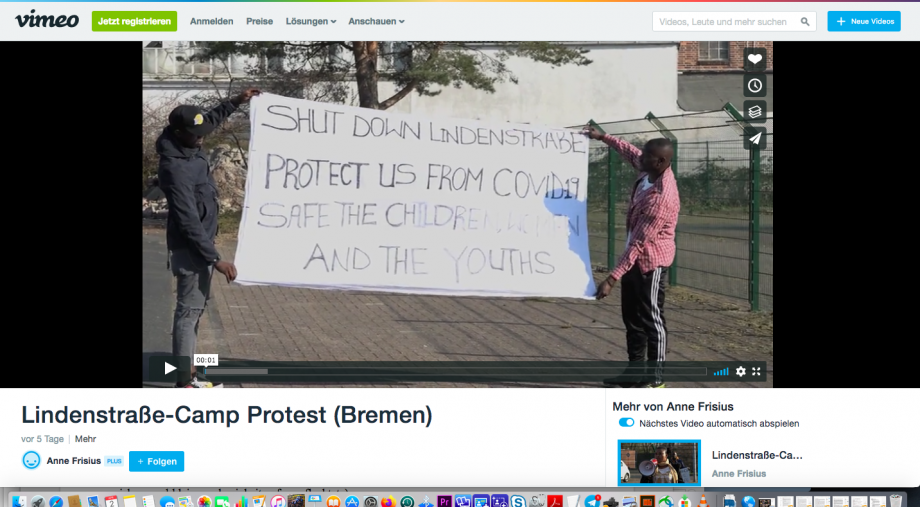
Thumbnail II: Big demonstration expressing the fear and the anger of the inhabitants of the Lindenstraße reception center. 2020. Copyright: Anne Frisius, 2020b (https://vimeo.com/403971372). The author has permission to use the video.
The experience of being left behind will become part of a collective memory of the migrant community of future Germany. Yet, the hope to leave behind the restrictions and limitations of structural racism was also tangible in the angry outcry during the demonstration. One inhabitant, the mother of a baby, proposed a vision for the future generation: “These children will grow […] and give their best to this nation. They are also Deutschland-Babies. You don’t know who will become a president in the future. This one, my baby, can be the next president!” (Frisius 2020b)
Addendum
Only a few days have passed between writing this blog article and its publication. The green party published a statement on (Die Grünen 2020) in which they claim that the announced admission of 50 unaccompanied minor refugees from Greek camps would only be possible if Lindenstrasse was retained as the arrival center. There is no material basis for this argument since the unaccompanied minors would be accommodated in youth welfare facilities. Such a statement only shows how vulnerabilities are discursively brought into competition with each other to retain the highly problematic camp system by all available means. After more than three weeks of fighting for protection, testing finally began on Lindenstraße, and 33 out of 62 people tested were found to be infected until now. The situation is inscrutable for the people living in the camp. According to the last report from Together We Are Bremen on April 15, internet connection had been disrupted for many hours. On several floors, quarantine zones had been established, and the inhabitants seemed to be in a panic.
First submitted on April 2, 2020, revised version from April 16, 2020
Dr. Silke Betscher is a lecturer at the department of social anthropology and cultural research at Bremen University. She is also involved in community research at the University of Applied Science (Hochschule für Gesundheit) in Bochum. Trained as a film editor, her research and teaching interests include a focus on visual anthropology, especially visual discourse analysis and collaborative visual methods. She did her Ph.D. at the School of Cultures, Languages and Area Studies at Liverpool University. In 2014-2015 she conducted ethnographic field research on politics, practices, economies, and infrastructures in voluntary and professional work with refugees, relating to her research project on visual media discourses about flight, migration, and border regimes. Currently, Dr. Betscher is working on a collaborative film project with Together We Are Bremen about medical age estimation, camps, and community organization.
#WitnessingCorona
This article was simultaneously published on the Blog Medical Anthropology. Witnessing Corona is a joint blog series by the Blog Medical Anthropology / Medizinethnologie, Curare: Journal of Medical Anthropology, the Global South Studies Center Cologne, and boasblogs.
References
Agamben, Giorgio. 2002. Homo Sacer. Die souveräne Macht und das nackte Leben. Berlin: Suhrkamp.
Baur, Domink, Helke Ellersiek, Christian Jakob, Konrad Litschko & Dinah Riese 2020. Mietet die Hotels für Geflüchtete! https://taz.de/!5673699/. Last access: 02/04/2020.
Betscher, Silke. 2020. In/Visibility, Silencing, Gaining Voice and agency in Visual Discourses on Refugees and Forced Migration of Refugees and Forced Migration. In: Julia Andres, Brian Rozema, Anne Schröder (eds.). (Dis-)Harmony: Amplifying Voices in Polyphone Cultural Productions, Bielefelder Schriften zu Linguistik und Literaturwissenschaft 30/ Bielefeld English and American Studies (BEAST) 8, 89-106.
Betscher, Silke. 2019. „They come and build their careers upon our shit“ oder warum ich 2014/15 nicht über Geflüchtete geforscht habe und sie dennoch maßgeblich zu meiner Forschung beitrugen – Reflexionen über strukturelle Hürden und Grenzen der Wissensproduktion. In: Kaufmann, Margrit E., Laura Otto, Sarah Nimführ & Dominik Schütte (eds.). Forschen und Arbeiten im Kontext von Flucht. Repräsentationslücken, Reflexions- und Ethikfragen. Wiesbaden: Springer VS. 237-261.
Betscher, Silke. 2018. Prekäre Räume – Prekäre Subjekte: Provisorische Behausungen und verwaltete Räume in visuellen Diskursen zu Flucht und Asyl. In: FKW// Zeitschrift für Geschlechterforschung und Visuelle Kultur, 64, 89-106. [doi: https://www.fkw-journal.de/index.php/fkw/article/view/1444].
Bhimji, Fazila. 2016. Visibilities and the Politics of Space: Refugee Activism in Berlin. In: Journal of Immigrant & Refugee Studies 4 (4), 432-450.
Buten un Binnen. 2020. Bremer Flüchtlingsvereine fordern Schließung zentraler Aufnahmestelle. https://www.butenunbinnen.de/nachrichten/politik/aufnahmestelle-lindenstrasse-protest-coronavirus-fluechtlinge-bremen-100.html. Last access: 11/04/2020.
Chouliaraki, Lilie & Tijana Stolic. 2017. Rethinking media responsibility in the refugee ‘crisis’: a visual typology of European news. In: Media, Culture & Society 39 (8), 1162–1177.
Die Grünen. 2020. Die Situation von Geflüchteten in Bremen und in der Landesaufnahmestelle. https://gruene-bremen.de/die-situation-von-gefluechteten-in-bremen-und-in-der-landesaufnahmestelle%e2%80%a8/. Last access: 11/04/2020.
Ferrarese, Estelle. 2020. Vulnerability. https://www.youtube.com/watch?v=yVuTH7RXBro&t=383s. Last access: 11/04/2020.
Finke, Björn. 2020. Handlungsfähig und solidarisch inmitten der schlimmsten Krise. https://www.sueddeutsche.de/politik/coronavirus-eu-hilfspaket-1.4873444. Last access: 11/04/2020.
Flüchtlingsrat Bremen. 2020. Willkür mit Ansage – Sozialbehörde sperrt sich gegen die geordnete Evakuierung der Lindenstraße auf Kosten der Bewohner*innen. https://www.fluechtlingsrat-bremen.de/cat/presse/pressemitteilungen/. Last access: 09/04/2020.
Frisius, Anne 2020a. https://vimeo.com/401504344. Last access: 11/04/2020.
Frisius, Anne, 2020b. https://vimeo.com/403971372. Last access: 11/04/2020.
Henkenberens, Carolin. 2020. https://www.weser-kurier.de/bremen/bremen-stadt_artikel,-bremer-fluechtlingsbuendnis-fordert-schliessung-der-landeserstaufnahmestelle-_arid,1904786.html. Last access: 11/04/2020.
Herscher, Andrew. 2017. Displacements: Architecture and Refugee. Critical Spatial Practice 9. Berlin: Sternberg Press.
Heuser, Uwe Jean. 2020. Corona-Wirtschaftskrise. Solidarität ja, aber bitte keine Eurobonds! https://www.zeit.de/2020/16/coronavirus-wirtschaftskrise-eurobonds-solidaritaet-verschuldung. Last access: 07/04/2020.
Keller, Gabriela. 2020. 100 Bewohner wechseln in Jugendherberge. https://www.weser-kurier.de/region/die-norddeutsche_artikel,-100-bewohner-wechseln-in-jugendherberge-_arid,1905150.html. Last access: 02/04/2020.
Ladebeck, Julia. 2018. Leben und Arbeiten im Ankunftszentrum in Bremen-Nord. https://www.weser-kurier.de/region/die-norddeutsche_artikel,-leben-und-arbeiten-im-ankunftszentrum-in-bremennord-_arid,1707152.html. Last access: 11/04/2020.
Schulze-Wessel, Juliane. 2017. Grenzfiguren – Zur politischen Theorie des Flüchtlings. Bielefeld: transcript.
Tagesschau. 17 March 2020. https://www.tagesschau.de/inland/maas-corona-rueckholaktion-101.html. Last access: 04/04/2020.
Täubig, Vicky. 2009. Totale Institution Asyl. Empirische Befunde zu all täglichen Lebensführungen in der organisierten Desintegration. Weinheim: Beltz.
TAZ. 2020a. Was tun? Solidarität in Zeiten von Corona. https://taz.de/Was-tun/!170543/. Last access: 04/04/2020.
TAZ. 2020b. Bremens Polizei geht gegen Demo vor. https://taz.de/Bremens-Polizei-geht-gegen-Demo-vor/!5672634/. Last access: 11/04/2020.
Together We are Bremen (TWAB). 2020. Voices from Lindenstraße. https://togetherwearebremen.org/. Last access: 02/04/2020.
Vetter, Dominika. 2020. Wenn Nachbarn helfen. https://taz.de/Archiv-Suche/!5674116&s=wenn%2Bnachbarn%2Bhelfen&SuchRahmen=Print/. Last access: 04/04/2020.
WHO. 2020. Covid-19 Solidarity Response Fund. https://www.who.int/emergencies/diseases/novel-coronavirus-2019/donate. Last access: 11/04/2020.































